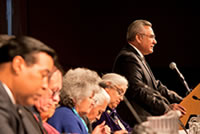“In order to secure to ourselves and our descendants the rights and benefits the traditional laws of our people to which we are entitled to as sovereign nations” – from the Preamble to the Constitution of the National Congress of American Indians – Denver, Colorado – 1944
The Unified Voice of Indian Country
Since 1944 NCAI has served as the unified voice for American Indian and Alaska Native Issues.
Founded in 1944, the National Congress of American Indians (NCAI) is the oldest, largest, and most representative American Indian and Alaska Native organization serving the broad interests of tribal governments and communities.
NCAI, a non-profit organization, advocates for a bright future for generations to come by taking the lead to gain consensus on a constructive and promising vision for Indian Country. The organization’s policy issues and initiatives are driven by the consensus of our diverse membership, which consists of American Indian and Alaska Native tribal governments, tribal citizens, individuals, and Native and non-Native organizations.
For nearly seven decades since its founding, NCAI has remained true to the original purpose of the organization: to be the unified voice of tribal nations. As outlined in the NCAI Constitution, our purpose is to serve as a forum for unified policy development among tribal governments in order to: (1) protect and advance tribal governance and treaty rights; (2) promote the economic development and health and welfare in Indian and Alaska Native communities; and (3) educate the public toward a better understanding of Indian and Alaska Native tribes.
Governance & Membership

NCAI 22nd President, Jefferson Keel and the Executive Committee conducting the annual conference of NCAI members.
NCAI is organized as a representative congress of American Indians and Alaska Natives that serves to develop consensus on national priority issues that impact tribal sovereignty. American Indian and Alaska Native governments pass resolutions to become members of NCAI, selecting official delegates to the NCAI Executive Council, Mid-Year Conference, and Annual Convention. During these events, delegates consider issues of pressing concern in accordance with their governments’ policies, goals, and needs. NCAI members vote on and pass resolutions to determine NCAI’s position on a broad range of issues.
NCAI members also elect the organization’s Executive Committee. The NCAI President, 1st Vice President, Recording Secretary, and Treasurer are elected by the entire membership. The twelve Regional Vice Presidents are elected by their respective regions. All board members serve for two-year terms.
Learn more about NCAI Leadership, Governance, and Membership.
Issue Advocacy & Public Education
Since as far back as President Franklin D. Roosevelt’s Administration, NCAI has been the leading voice for tribal interests in Washington, DC, ensuring that the federal government upholds its trust responsibility to tribal nations and Native peoples.
Today, NCAI is actively engaged through national and international advocacy efforts, educational campaigns and events, and programmatic initiatives. These efforts and partnerships promote strong tribal governments and address the many human, economic, social, environmental, and cultural needs of Native communities.
The NCAI Policy Research Center (PRC), is a tribally driven think tank established as a program of NCAI in 2003. The PRC supports and informs policy development efforts with tribally driven data and analysis.
These combined efforts offer the most comprehensive tribally driven solutions focused on strengthening tribal nations, educating the general public, and enhancing the nation-to-nation relationship between tribal governments and the governments of the United States.
Support for NCAI
NCAI’s efforts are made possible by generous foundation and partner support, annual tribal and individual membership fees, and donations from individuals.